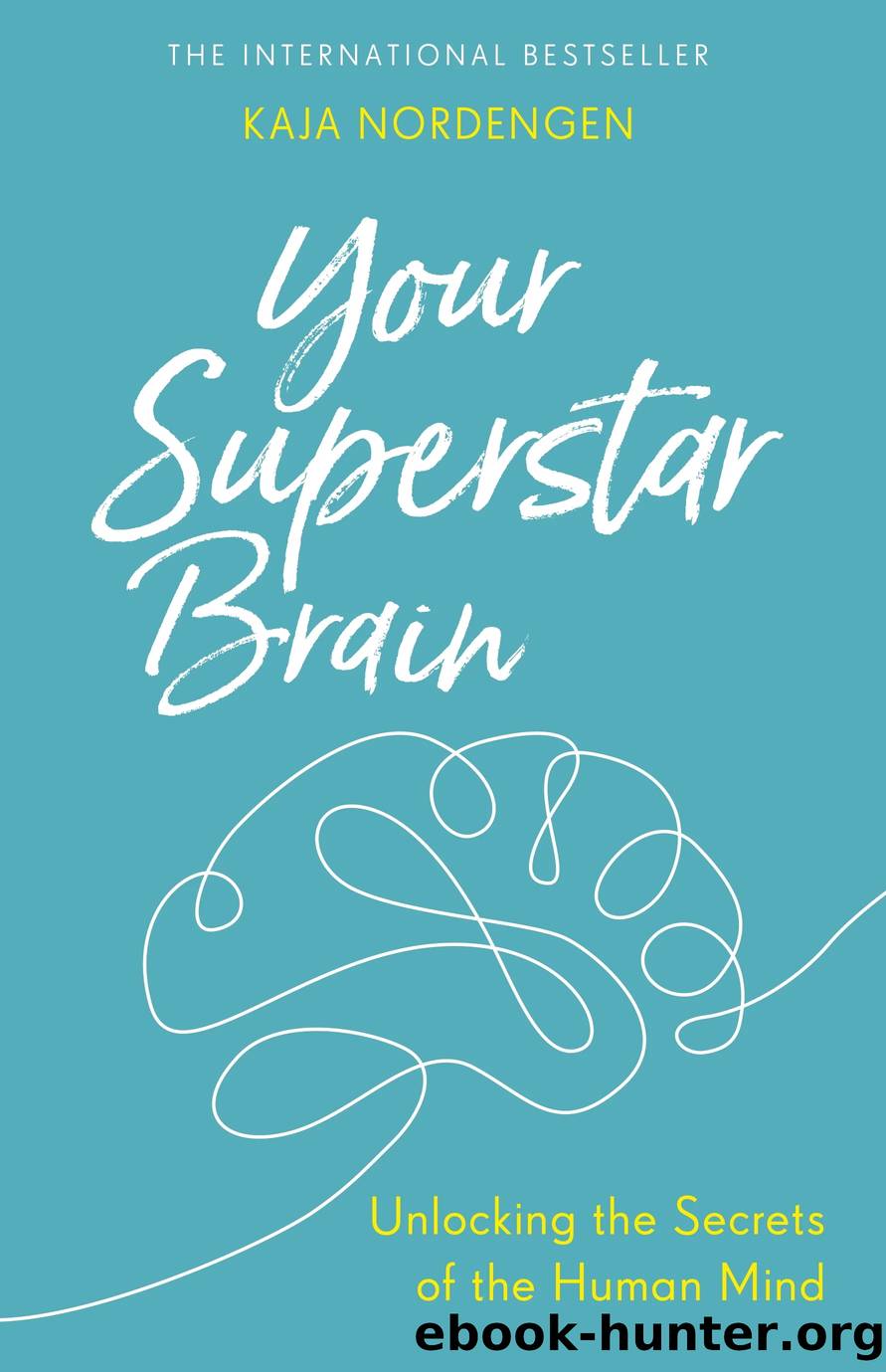Your Superstar Brain by Kaja Nordengen

Author:Kaja Nordengen [NORDENGEN, KAJA]
Language: eng
Format: epub
ISBN: 9780349417202
Published: 2023-03-29T00:00:00+00:00
Anxious about anxiety
Early one morning, when I was sitting in the laboratory, one of my colleagues walked through the door and shouted, âHi.â This startled me because I hadnât expected anyone else to turn up for many hours and I was so focused on what I was doing that I hadnât heard his footsteps in the corridor. As a result, I dropped the glass cylinder I was holding and it shattered on the floor. My colleague wryly remarked that he wouldnât bother saying hello in future if that was my reaction.
In such situations, Iâm tempted to curse my overactive amygdala â the brainâs emotional centre. It makes me spill hot coffee every time I walk round a corner and meet someone unexpectedly, and Iâve got reams of notes in which a line of ink veers right off the edge of the page because someone shouted my name at an inopportune moment. Feeling startled is a completely spontaneous reaction. After all, the amygdala is one of the more primitive parts of the human brain, so it reacts to sensory information almost immediately. I simply donât have the time to interpret the abrupt sound I hear as a friendly greeting. Cecilie, one of my closest colleagues, understands this, so she now makes a discreet noise before approaching me. As a result, Iâve wrecked less of our research than I might have done!
Thereâs a big difference between my sort of jumpiness and full-blown anxiety. Indeed, anyone whoâs experienced anxiety will tell you that itâs one of the worst things a person can experience. In effect, your whole body reacts to the fact that your brain has just pushed the alarm button. Youâre so scared that your chest tightens and you feel a knot in the pit of your stomach. Youâre convinced that your heart is about to jump out of your ribcage. You become dizzy and feel as if youâre about to faint. The effects are so severe that millions of people choose to isolate themselves and avoid places or situations that might trigger an attack. For example, if a person has suffered a panic attack in a grocery store, they might avoid all grocery stores or even refuse to set foot outside the house.
The amygdala sits at the tip of the hippocampus (see Fig. 17), and the two work very closely with each other. With the hippocampusâs help, you are able to remember the last time you started to hyperventilate and almost fainted in the queue for the checkout. That memory alone is enough to activate your amygdala, so you become anxious about your own anxiety.
We feel anxiety when rational fear is allowed to run wild. In general, fear is a beneficial emotion: it stops us putting our hands in open fires and persuades us not to wander down dark alleys in crime-ridden parts of town. If we walk too close to the edge of a cliff, our amygdala decides that we should start to feel afraid so it sends out signals that make our legs shake and our palms sweat.
Download
This site does not store any files on its server. We only index and link to content provided by other sites. Please contact the content providers to delete copyright contents if any and email us, we'll remove relevant links or contents immediately.
| Administration & Medicine Economics | Allied Health Professions |
| Basic Sciences | Dentistry |
| History | Medical Informatics |
| Medicine | Nursing |
| Pharmacology | Psychology |
| Research | Veterinary Medicine |
Machine Learning at Scale with H2O by Gregory Keys | David Whiting(4192)
Fairy Tale by Stephen King(3221)
Will by Will Smith(2794)
Hooked: A Dark, Contemporary Romance (Never After Series) by Emily McIntire(2502)
Rationality by Steven Pinker(2291)
Friends, Lovers, and the Big Terrible Thing by Matthew Perry(2123)
The Becoming by Nora Roberts(2089)
Love on the Brain by Ali Hazelwood(1965)
HBR's 10 Must Reads 2022 by Harvard Business Review(1778)
The Strength In Our Scars by Bianca Sparacino(1777)
A Short History of War by Jeremy Black(1763)
Leviathan Falls (The Expanse Book 9) by James S. A. Corey(1651)
515945210 by Unknown(1602)
A Game of Thrones (The Illustrated Edition) by George R. R. Martin(1594)
Bewilderment by Richard Powers(1541)
443319537 by Unknown(1471)
The 1619 Project by Unknown(1387)
The Real Anthony Fauci: Bill Gates, Big Pharma, and the Global War on Democracy and Public Health (Childrenâs Health Defense) by Robert F. Kennedy(1366)
Fear No Evil by James Patterson(1280)
